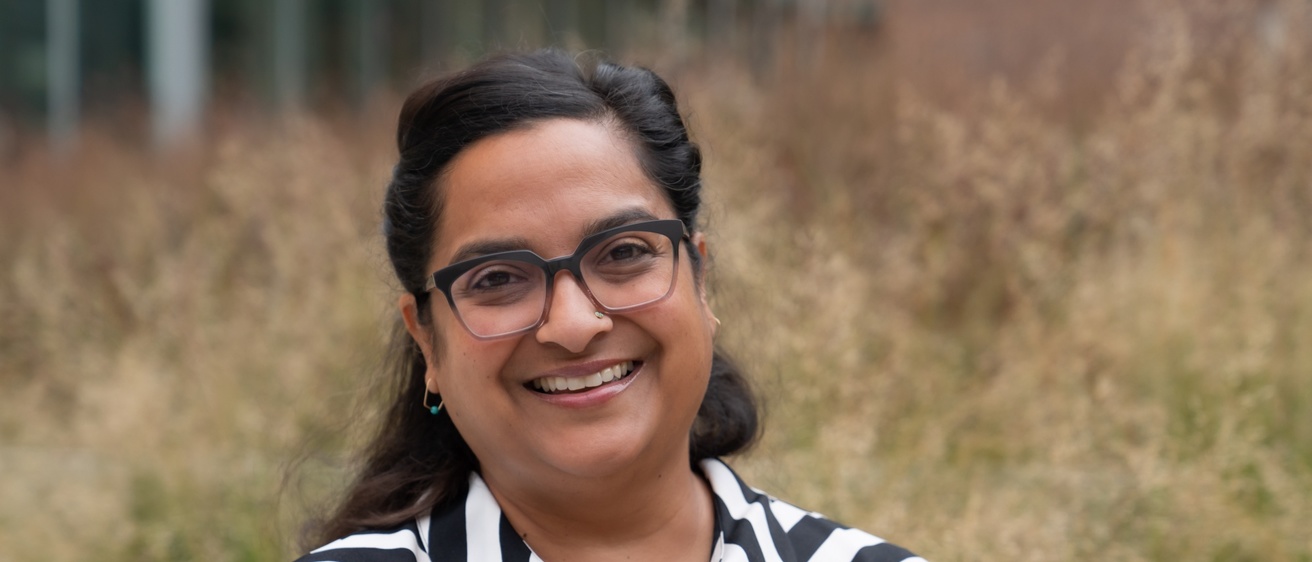Saba Vlach, new assistant professor in the UI College of Education’s Language, Literacy, and Culture doctoral program wants her students to become agents of change in their classrooms.
Prior to joining the College of Education in fall 2019, Vlach was an elementary teacher in Arlington, Texas for 17 years. While teaching, she earned her Master of Arts in Reading Education from Texas Women’s University in 2011. Vlach earned her Ph.D. in Curriculum, Instruction, and Assessment from the University of Texas at Austin in 2019. Vlach says she did not leave the classroom because of burnout, but because she had the desire to learn more and conduct original scholarship.
“I knew I wanted to learn more. Especially because of my family’s status in this country as immigrants and my own status as a woman of color, I felt like I did not fully understand the history of public school in America,” says Vlach. “I often felt that there were things that needed to be unpacked and that there were institutional ways that children were being oppressed. Getting my Ph.D. served as a way to help me understand what the institution of public school was about.”
Vlach felt that the University of Iowa was the best place for her to combine her passion for research and teaching.
“For the work that I want to do with anti-oppressive education, being a faculty member is one way to do it,” says Vlach. “I’m very serious about my scholarship and teaching, and I wanted to be at a place that made space for their faculty members to do both things. I felt like the University of Iowa was a very good fit for me.”
Vlach’s research focuses on veteran in-service teachers who identify as critical educators, teachers who are actively involved in critiquing, questioning, and challenging curriculum, and how they apply critical methods in their literacy instruction.
She also studies how to teach educators to teach critically through children’s literature. Additionally, she is interested in how children’s literature is utilized by teachers to help students to not only develop their own critical consciousness and maintain cultural competence, but to also learn how to question literature. Her research also explores learning about issues of inequality and oppression at a young age.
In the future, Vlach would also like to examine her own identity as a Pakistani Muslim, and a descendant of immigrants through her research.
“I have never looked at Muslim, immigrant, or refugee children, and I would love to see teachers’ work with these children and how these particular children are thinking about their status as citizens in this country, and starting with literature and looking at their other literacy experiences that these children have from a result of their identity,” says Vlach. “I want to understand their literacy lives and how their stories are being told and honored by schools and educators. We have this narrative about Muslim children and immigrant children that isn’t accurate, and I want to know how they are resisting those narratives.”
In her teaching, Vlach wants to plant a seed of knowledge about racism, inequality, oppression, and the way identities intersect, especially for students who may have never had to interact with these issues.
“I want for students to leave with a seed planted that we have engaged in some dialogue every class around these issues, and we have bridged these things with your role as a literacy teacher,” says Vlach. “I want them to feel like they did some inquiry, they engaged in conversations, and they now have a decision to make about how they advocate. It’s not enough to just be nice to their students. I would really like them to think about their own teaching, as well as the institution and figure out what their role is.”
Vlach hopes she will inspire future teachers to create inclusive learning environments that embrace all students.
“I don’t want to alienate anyone, but I want to make sure everyone gets a chance to speak their truth, and it’s not a judgment on your upbringing or who you are, but it is eye-opening for these students,” Vlach says.
Vlach also wants her students to be in love with teaching before they enter their own classrooms.
“I want my students to think deeply about why they have chosen this profession and already have a deep love for it. I don’t want them to fall in love with it when they start teaching I want them to already be in love with it,” says Vlach. “I want them to love it because it’s really hard work, it’s so much more than saying ‘I’m going to give you this content and read you this book’, it’s about being an agent of change. If we’re making agents of change then you have to be one yourself.”
